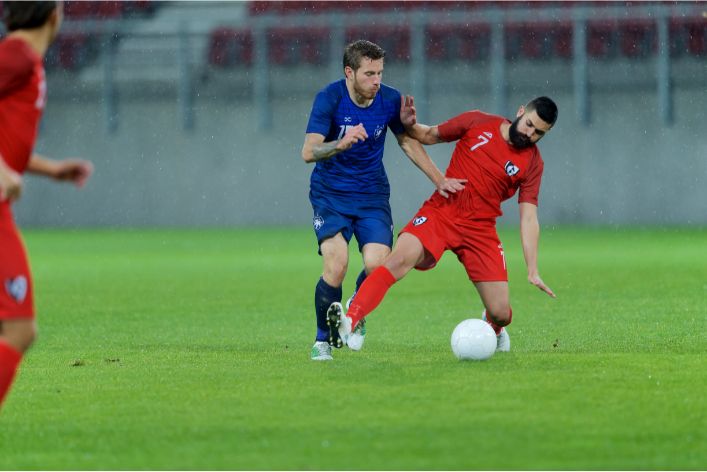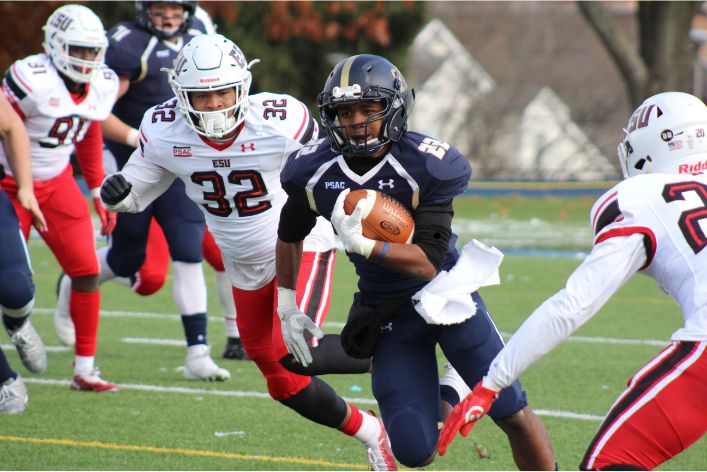Last Updated on May 26, 2023
To negotiate a fair pay as a footballer is crucial for one’s career progression and financial stability. The compensation package for a player is influenced by several factors, including their performance, age, experience, and market value.
As a result, it is essential for football players to understand the importance of negotiating their pay and the factors that affect player compensation. This blog post aims to provide the best strategies to help footballers negotiate their pay effectively.

The purpose of this blog post is to equip football players with the knowledge and tools necessary to negotiate their worth in the industry. With this information, players can build a strong negotiating position, increase their earning potential, and secure more favorable terms in their contracts.
By the end of this post, readers will have a better understanding of the art of negotiation, key strategies to employ, and how to use their strengths to achieve the best compensation package possible. With the right preparation, players can confidently enter into negotiations with their clubs and maximize their earnings while advancing their careers.
Basically, this blog post will provide valuable insights for football players on how to negotiate their pay. The information presented is aimed at empowering players to take control of their careers and reach their full potential in the industry.
Read: How do Football Clubs Make Money?
Research
Before entering into negotiations, it is important for footballers to conduct thorough research in order to understand their market value and the factors that may affect their pay. Here are some of the key factors that influence pay in the football industry:
- Skill level
- Experience
- Performance history
- Market demand
- Team financial resources
In order to conduct effective research, footballers should consider the following:
- Analyze comparable player contracts:
- Footballers should look at the pay and benefits that other players in their position, with similar skill and experience levels, are receiving.
- This can be done through research online or by consulting with a player agent.
- Footballers should look at the pay and benefits that other players in their position, with similar skill and experience levels, are receiving.
- Understand team financial reports:
- Footballers should study their team’s financial reports to understand the resources available to them.
- This is important because a team may not have the budget to pay a player as much as they would like.
- Footballers should study their team’s financial reports to understand the resources available to them.
- Consult with a player agent or financial advisor:
- Player agents and financial advisors can provide valuable insight into the current market conditions for player pay, and can help negotiate a fair deal for their clients.
- They can also help footballers understand the tax implications of their pay structure and ensure they are receiving benefits such as insurance and retirement plans.
- Player agents and financial advisors can provide valuable insight into the current market conditions for player pay, and can help negotiate a fair deal for their clients.
By conducting thorough research, footballers can enter into negotiations with a clear understanding of their market value and what they can realistically expect in terms of pay and benefits.
Read: How to Find Value in Betting on Underdog Teams
Preparation
As a footballer, negotiating your pay is an important part of your career progression. If you want to get paid what you’re worth, you need to approach negotiations strategically. One of the most important things you can do is to prepare for negotiation.
Importance of being prepared for negotiations
Preparation is key when it comes to negotiations. Without proper preparation, you may find yourself stumbling over your words or not getting your point across effectively. Here are some reasons why being prepared is important:
- You are more confident when you are prepared and have thought through potential objections and compromises.
- You are less likely to be caught off guard by unexpected questions or issues.
- You are better able to make a persuasive case for increased compensation when you are prepared with a strong argument.
How to prepare for negotiations
Now that you understand the importance of preparation, here are some strategies for preparing for negotiations:
Set goals and priorities
Before going into negotiations, it’s important to have a clear idea of what you want to achieve and which factors are most important to you. For example, you might want to prioritize getting a higher base salary over other perks like bonuses or signing bonuses. Knowing your priorities can help you stay focused during negotiations and make decisions that align with your goals.
Anticipate team objections and potential compromises
It’s important to be aware of potential objections or compromises that the team may bring up during negotiations. For example, they may argue that they can’t afford to pay you more or that your performance hasn’t been strong enough to warrant a raise. By anticipating these objections, you can prepare responses that address these concerns and make a stronger case for increased compensation.
Build a strong argument for increased compensation
To make a strong case for increased compensation, you need to be able to articulate your value to the team. This may include documenting your performance and statistics, highlighting your contributions to the team, and researching market trends to show how your pay compares to similar players. By building a strong argument, you can convince the team that you are worth investing in.
Role-playing and practice negotiations
Finally, it’s important to practice negotiating in a safe environment before going into the actual negotiation. This can include role-playing with a friend or mentor, or working with a negotiation coach. Practicing can help you refine your argument, build confidence, and be better prepared for unexpected challenges.
Negotiating your pay as a footballer requires a strategic approach and careful preparation. By setting goals, anticipating objections, building a strong argument, and practicing negotiations, you can be more confident and effective during negotiations, and increase your chances of getting the compensation you deserve.
Read: The Psychology of Sports Betting: Understanding Your Own Biases

Communication
Communication plays a vital role in determining the outcome of a negotiation process. Here are some tips on how to communicate effectively during a pay negotiation as a footballer:
Be confident and assertive
Confidence is key when it comes to negotiating your pay as a footballer. You need to believe in yourself, your skills, and your worth to the team. Assert yourself clearly and calmly, being careful to avoid any aggression or arrogance.
Use active listening
Active listening is the art of focusing on and understanding the other party’s perspective. Listen attentively to the team representatives, acknowledge their points, and then provide your own perspective. This can show that you respect and value their opinion, helping create a more positive atmosphere for successful negotiations.
Use persuasive language and data-driven arguments
To back up your worth to the team, it is important to use persuasive language and provide data-driven arguments during negotiations. Explain why you feel you deserve a specific amount of pay, what benefits you can bring to the team, and provide evidence to support your claims. Using statistics about your performance can help to strengthen your arguments and provide additional support.
Build a relationship with the team
Building a healthy professional relationship with the team can work in your favor during pay negotiations. This can be done by showing interest in the team’s goals and strategies, volunteering in team events, and being a positive member of the team. It can help create an atmosphere of trust and respect, potentially giving you more leverage in negotiating your pay as a valued member of the team.
Effective communication can help you successfully negotiate your pay as a footballer. By being confident, and assertive, using active listening, and persuasive language, presenting data, and building a relationship with the team, you can make your case and potentially secure a fairer pay arrangement that values your contribution to the team and the sport.
Read: Is Betting an Investment?
Negotiation
The negotiation process is a crucial part of a footballer’s career, particularly when it comes to discussing pay. Let’s explore the best strategies for negotiating your pay as a footballer, including the process and timeline, how to negotiate effectively, when to walk away from negotiations, and more.
The Negotiation Process and Timeline
The negotiation process typically starts with a meeting between you and your agent or representative to discuss your expectations, goals, and negotiating strategy. From there, your agent will approach the team or club with a proposal that outlines your desired salary and any other contractual agreements you may have.
It’s important to keep in mind that negotiations can take time. Depending on the team you are negotiating with, the process can take anywhere from a few days to several weeks or even months. It’s crucial to be patient and stay focused on your goals throughout the negotiation process.
How to Negotiate
When negotiating your pay as a footballer, it is essential to follow a few key strategies:
- Start with a friendly and positive tone.
- Make the initial offer and justify it with data-driven arguments, such as your statistics, achievements, and market value.
- Counter any team objections with data-driven arguments as well, and be prepared to back up your claims with evidence.
- Find mutually agreeable compromises that benefit both you and the team, such as negotiating bonuses or performance incentives.
When to Walk Away from Negotiations
While negotiations can be lengthy and challenging, sometimes it’s necessary to walk away from the table altogether. Some reasons you might consider walking away from negotiations include:
- The team is not meeting your salary expectations
- The team is offering contract terms that are not favorable or do not meet your goals
- There is no room for negotiation or compromise
- You feel undervalued and are not being taken seriously
It’s essential to know your worth and be willing to stand up for yourself during negotiations. By being knowledgeable about your statistics, market value, and the current state of the football industry, you can negotiate a favorable contract that meets your goals and sets you up for long-term success.
Negotiating your pay as a footballer can be a challenging and complex process, but it’s also a critical one. By following the strategies outlined above, you can approach negotiations with confidence, knowing that you’re prepared to advocate for yourself and your worth. Remember to be patient, stay focused, and be willing to walk away if the negotiations aren’t meeting your needs.
Read: Is Investing in a Football Club Profitable

Follow-up
After successful negotiations for your pay as a footballer, it is crucial to follow up for several reasons. Firstly, it ensures that all agreed-upon terms are met and prevents any misunderstandings or disputes in the future. Secondly, it shows a level of professionalism and commitment to your career and the team you are representing. Finally, following up allows you to revisit negotiation strategies and adapt them for future contracts, maximizing your earnings.
Importance of Follow-up
- Maintains a professional relationship with your employer and shows your desire to uphold your side of the bargain.
- Ensures that all agreed-upon terms are being met and prevents any future conflicts.
- Shows that you value your career and the team, increasing your chances of being offered future contracts.
How to Follow-up
- Review any agreed-upon terms in writing and keep a copy on file.
- Track your pay and bonuses to ensure that you are receiving the agreed-upon amount.
- Revisit negotiation strategies and adapt them for future contracts.
One of the most important aspects of following up is reviewing any agreed-upon terms in writing. This could include the duration of your contract, your salary, bonuses, and any other benefits. Having a written record of these terms ensures that they are met, and should any disputes arise, you have a clear basis for negotiation.
Tracking your pay and bonuses is also crucial to ensure that you are receiving the agreed-upon amount. Keep a record of each payment, including any deductions, and compare the figures to the terms of your contract. If there are any discrepancies, bring them to the attention of your employer as soon as possible.
Lastly, revisiting negotiation strategies is essential for future contracts. Consider what worked well and what could be improved upon in your previous negotiations. Use this knowledge to devise new strategies that maximize your earnings and benefits while remaining within the team’s budget constraints. It is always best to be proactive about negotiations rather than waiting for your contract to expire and starting from scratch.
Following up after negotiations is just as crucial as the negotiations themselves. It ensures that all agreed-upon terms are met, demonstrates your professionalism and commitment to your career and the team, and helps you make the most of future contract negotiations. Remember to keep a record of any agreed-upon terms, track your pay and bonuses, and revisit negotiation strategies for future contracts. These steps will help you achieve your career goals and maximize your earnings as a footballer.
Read: The Contribution of African-American Athletes to Sports History
Conclusion
After evaluating the best strategies for negotiating pay as a footballer, it is essential to recap the insights shared.
- Research is pivotal in any negotiation process. Get familiar with the club’s financial status, their salary structure, and what other players are earning in similar positions.
- Timing is crucial. Make your demands at the appropriate time, preferably after achieving exceptional performance on the pitch.
- It is vital to have alternative pay structures. This includes performance-based pay, signing-on bonuses, and image rights.
- It is useful to have an agent to assist in the negotiations. Agents have vast experience in salary negotiations and can provide expert counsel.
- Be confident, but avoid overconfidence. Know your worth and the value you bring to the team, but be open-minded and willing to compromise.
On a final note, negotiating pay as a footballer is a crucial aspect of the game. It is important to be proactive, confident, and well-informed throughout the process. By implementing these strategies, players can ensure that negotiations are fair and fulfilling. Remember that negotiations are a delicate balance, and with the right approach, both parties can reach a mutually beneficial agreement.
Read: Why Africa Boycotted the 1966 World Cup
Before You Go…
Hey, thank you for reading this blog to the end. I hope it was helpful. Let me tell you a little bit about Nicholas Idoko Technologies. We help businesses and companies build an online presence by developing web, mobile, desktop, and blockchain applications.
We also help aspiring software developers and programmers learn the skills they need to have a successful career. Take your first step to becoming a programming boss by joining our Learn To Code academy today!
Be sure to contact us if you need more information or have any questions! We are readily available.











